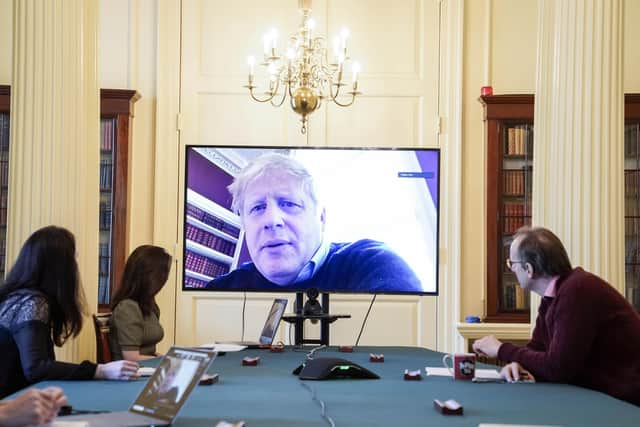Alex Kane: The ordinary pleasures of these extraordinary times


A 21-year-old girl with no underlying symptoms. People in their 30s, 40, 50s, 60s, 70s and 80s. A man who was born in 1919, when the Spanish Fly pandemic was sweeping the world. The fabulously wealthy. The poverty stricken. Brilliant academics.
Covid-19 doesn’t give a damn. Not a single damn. Your background and location is irrelevant. If it can reach you it will strike you down: sometimes fatally, sometimes devastatingly – yet stopping short of death, sometimes not much more than a passing blow. And none of us has any certainty – even guesswork seems pointless – about which category we’ll fall into.
Advertisement
Hide AdAdvertisement
Hide AdRight at the start of the scare there was a view – no more than a form of urban myth, as it happens – that older people, 65+ and maybe already regarded as ‘vulnerable’ in one way or another, would be hit hardest.


Yet we soon discovered that the virus is no respecter of younger people, or those not regarded as vulnerable, either. As I’ve said, it doesn’t give a damn.
I actually took some comfort from the fact that, a few months short of my 65th birthday, I was probably more vulnerable. Maybe not a dead cert (apologies, I like awful puns), but certainly with less favourable odds than the others in my household Kerri, Megan Lilah and Indy.
I’m certainly in no rush to shake the Grim Reaper’s hand anytime soon – I’m presuming he wouldn’t go in for elbow-rubbing, even now – but if Covid-19 comes into our house I dread the prospect of one of the others dying while I survive. That would be truly unbearable.
Advertisement
Hide AdAdvertisement
Hide AdMaybe it’s because I’m in my mid-60s, or an older dad with children, or because the present crisis has made me revisit and reflect upon the mistakes and missed opportunities in my past, or the fear of the virus, or maybe even a combination of those and other factors; but I do find myself unexpectedly upset, even weepy right now.
Sleep is difficult. Relaxing is difficult. Switching off and tuning out is impossible. Politics and politicians no longer interest me. Oddly, I’m finding a quiet comfort in The Chronicles of Narnia, which I’ve never read before. Brilliantly written and hugely inventive.
I find myself watching the young blackbirds hopping around our decking and feasting on the cat’s food. They’ve got used to me and ignore me as I walk to and fro, often within inches of them. We still have a couple of robins very happy to sit right beside me as I dig through the soil.
I lay in the hammock on Thursday lunchtime and listened to the noise: not of planes and traffic, but of glorious, wonderfully cheerful birdsong. We have a grey squirrel who visits our tree-house and vegetable-patch barrels. Last year I would have chased him. Today, I smile and chat.
Advertisement
Hide AdAdvertisement
Hide AdIn one way this is all so matter of fact, yet in so many other ways it is extraordinary. All of this is, quite literally, happening in my own backyard. It’s like having a spacious outdoor extension where we can unwind, run around, play swing-ball (or other games we’ve invented) and bounce on the trampoline.
As I say, very ordinary in one sense (all those things have been there since we moved into the house about 18 years ago) yet psychological life-savers right now. We are always able, in a very specific, very important way, to ‘leave the house’ and go outside. We don’t need to walk to a park, or drive to a beach, or find a hill to climb.
Outside is through the kitchen door. And it’s there anytime and every time we want it; either separately or together. We spend hours in it every day and Indy, 32 months, runs himself ragged.
Believe me, I’ll never take the garden for granted again. I’ll never complain again about mowing, digging, cleaning-up, watering, leaf-clearing, dead-heading, weed-killing, fence-fixing or any of the other dozens of little jobs I always tried to avoid. At a time like this, we are blessed – and I mean that in the real sense of the word – to have the garden.
Advertisement
Hide AdAdvertisement
Hide AdWhen this is all over maybe the developers, planners and architects who specialise in urban projects will consider the importance of your own, everyday, outside space, to our collective mental health?
Like everyone else I also find myself focusing on the what-ifs from my past and present and the ‘I wonder whats’ if I survive, or don’t survive. One firm decision has been made: if I make it through to the other side of this crisis I will get all of my adoption files and background details and read them.
I had wonderful adoptive parents in Sam and Adelaide, who provided me with the love, support, strength and supply of second chances I needed to have the life I have now. But I exist because of two other people. I hope I haven’t left it too late to find out about them. Whatever happened and for whatever reason I was placed in an orphanage the fact remains I still have a debt of gratitude to my birth parents. I wouldn’t be here without them.
I’ve also begun a diary about what’s happening right now: the story of an ordinary family and how they coped in extraordinary circumstances. I don’t know whether I’ll ever get to finish it, but as a writer it would be absurd not to record as much as I can about what is happening at this crucial moment in world history.
Advertisement
Hide AdAdvertisement
Hide AdAnd precisely because these are extraordinary times it is important that as many of you as can, also keep a diary, or even just a notebook, about your own experiences, reflections, fears and memories. What is happening now is happening to all of us and that’s why the collective, personal stories must be saved and told.
Finally, stay strong, stay safe, stay healthy. Be more patient with each other, particularly the children. The next few weeks are going to be really, really difficult, I fear. Best wishes to all of you. And a huge thanks to all the News Letter team, working in very trying circumstances to ensure the paper is published every day.